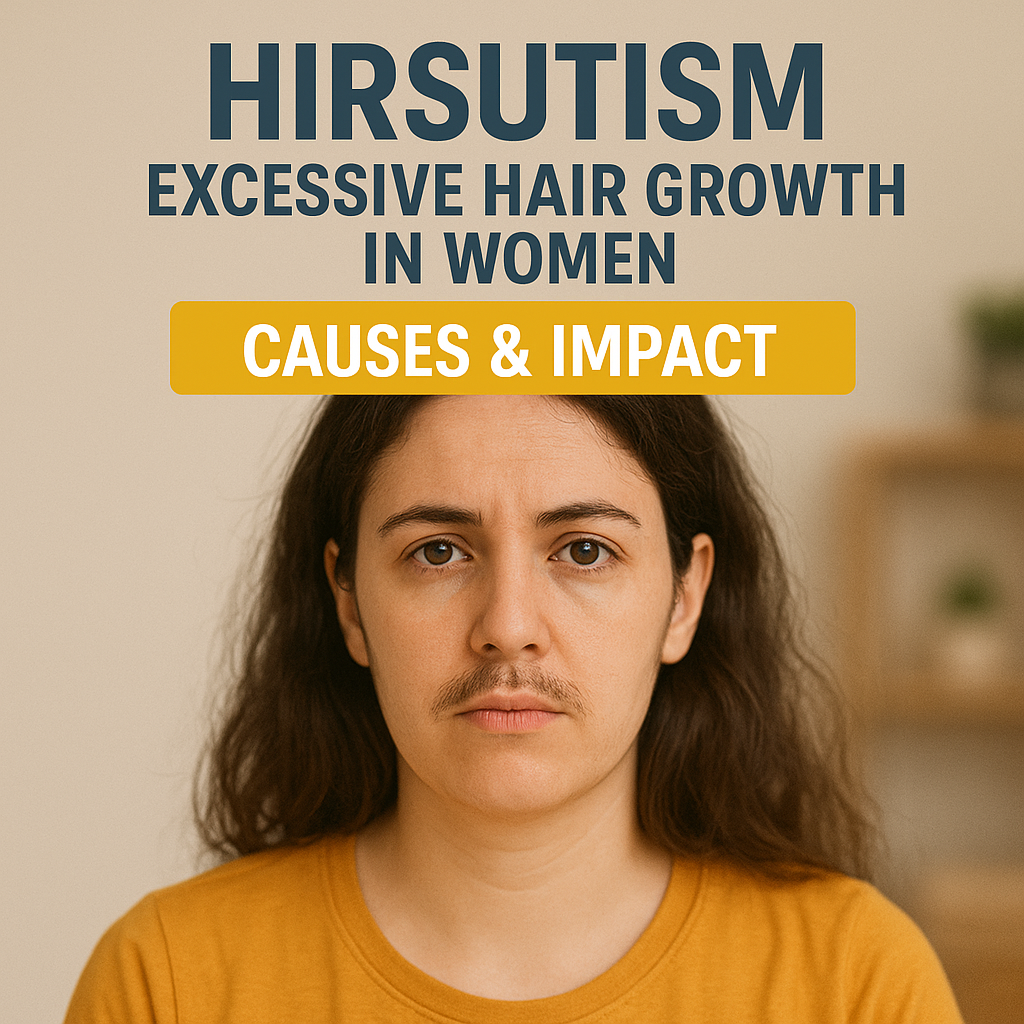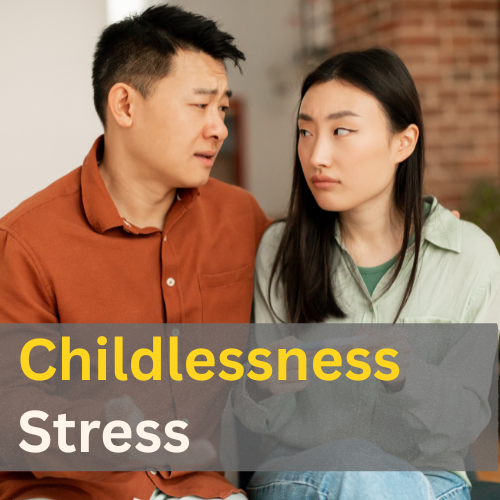Table of Contents
Understanding Hirsutism in Women:
Excessive hair growth in women, especially in areas like the face, chest, and back, can be a source of significant distress. For many women, this condition, known as hirsutism, is not just a cosmetic concern but a source of emotional and psychological stress. In this comprehensive guide, we’ll break down what hirsutism is, the common causes behind it, its emotional impact, and explore the various treatment options available today. Whether you’re experiencing hirsutism yourself or simply seeking to understand it better, this article offers valuable insights and practical advice on how to manage excessive hair growth in women.
What is Hirsutism?
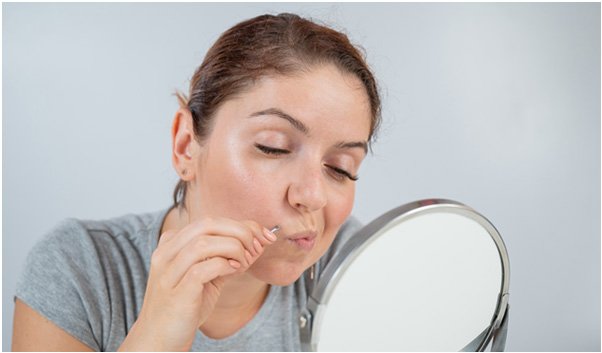
Hirsutism is a condition where women experience excessive, male-pattern hair growth. This can manifest in areas such as the face (upper lip, chin), chest, abdomen, back, and sometimes even the arms and legs. The growth of thick, dark hair in these areas is typically caused by an imbalance in the levels of male hormones, known as androgens. While androgens are naturally present in both men and women, women with hirsutism have higher levels of these hormones, which leads to male-pattern hair growth.
Hirsutism is often a symptom of an underlying health issue, making it crucial to understand the causes behind it and how to manage it effectively. In this article, we’ll explore how hirsutism affects women, identify the causes, its emotional impact, and provide effective treatment options. For women experiencing this condition, it’s essential to identify the causes to find an appropriate treatment. Recognizing the symptoms of hirsutism early can significantly improve treatment outcomes.
Common Causes of Hirsutism in Women
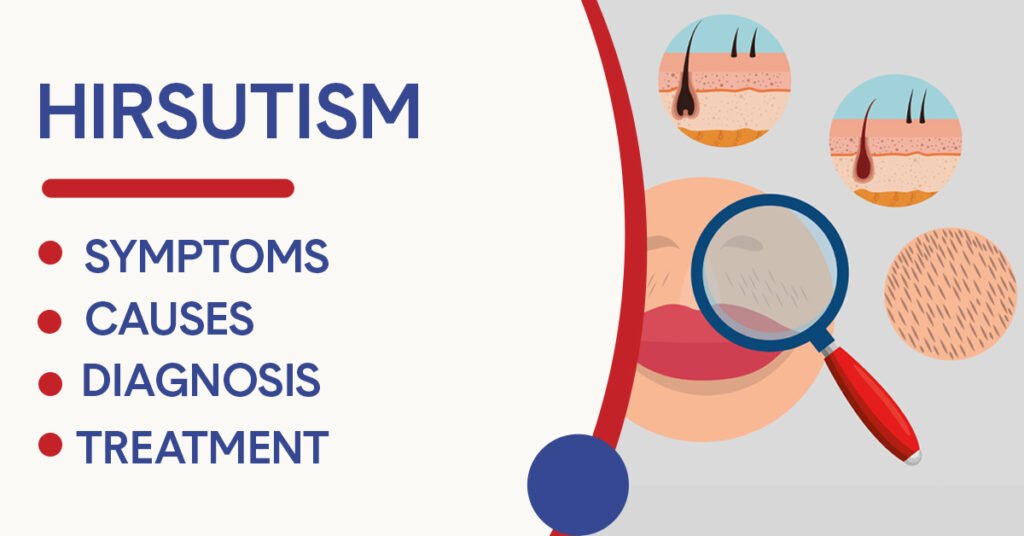
Understanding the root cause of hirsutism is crucial for effective treatment and management. There are several underlying conditions and factors that can contribute to excessive hair growth in women.
1. Polycystic Ovary Syndrome (PCOS)
Polycystic Ovary Syndrome (PCOS) is one of the most common causes of hirsutism. This hormonal disorder affects approximately 5-10% of women of reproductive age and is a significant factor in the development of excess body hair. Women with PCOS tend to have higher levels of androgens, or male hormones, which can lead to excessive hair growth, irregular menstrual cycles, weight gain, and other symptoms like acne.
PCOS can cause the ovaries to enlarge and form small cysts, which can interfere with the normal function of the ovaries. This disruption leads to hormonal imbalance, and higher androgen levels lead to symptoms like hirsutism. PCOS is often associated with insulin resistance, which further exacerbates the condition by increasing androgen production.
Women with PCOS may notice symptoms like weight gain, acne, and difficulty losing weight, but hirsutism is one of the most common complaints. Treatment often involves medication to manage the symptoms, such as birth control pills to regulate hormones and medications like spironolactone to reduce androgen effects.
Mayo Clinic’s Insights on PCOS offers an in-depth guide on understanding the condition further.
2. Genetics
For some women, excessive hair growth can simply be due to genetic factors. This means that the predisposition to develop hirsutism can be passed down through family lines. If your mother, grandmother, or other female relatives have experienced hirsutism, there may be a higher likelihood that you will also develop the condition. This type of inherited hirsutism tends to be milder compared to conditions like PCOS, but it can still be frustrating to manage.
Women of certain ethnic backgrounds, such as those from Mediterranean, Middle Eastern, and South Asian descent, are more prone to experiencing hirsutism due to genetic predisposition. While this type of hirsutism is often less severe, it is still something that women may seek treatment for, particularly for cosmetic reasons.
3. Medications
Certain medications can trigger hirsutism as a side effect. Medications that affect hormone levels, such as anabolic steroids, testosterone supplements, or medications for seizures and cancer, can lead to higher levels of androgens in the body. Some medications used to treat other conditions may indirectly cause hirsutism due to their influence on hormonal balance.
If you are taking medications like birth control pills, corticosteroids, or medications for epilepsy, it’s important to monitor any side effects, including unwanted hair growth. Women who experience this side effect should speak with their healthcare provider to explore alternatives or make dosage adjustments.
4. Cushing’s Syndrome
Cushing’s syndrome is a rare condition that occurs when the body is exposed to high levels of cortisol, a hormone produced by the adrenal glands. Cortisol helps regulate several body functions, but an excess of it over prolonged periods can lead to various symptoms. One such symptom is hirsutism, particularly on the face and body.
Cushing’s syndrome can be caused by tumors in the adrenal glands or pituitary gland, which leads to overproduction of cortisol. In women with Cushing’s syndrome, other symptoms may include weight gain, thinning of the skin, bruising, and hair growth in unusual places. Early diagnosis and treatment can help in managing the condition and reducing its physical symptoms.
5. Congenital Adrenal Hyperplasia (CAH)
Congenital Adrenal Hyperplasia (CAH) is a genetic disorder that affects the adrenal glands, which are responsible for producing both androgens and cortisol. In women with CAH, the adrenal glands produce an excess of androgens, leading to symptoms like excessive hair growth, irregular periods, and sometimes infertility. CAH can be diagnosed early in life or later, depending on the severity of the symptoms.
Women with CAH may experience varying degrees of hirsutism, and the treatment typically involves managing hormone levels. Early detection and treatment can help women manage symptoms effectively and prevent complications such as infertility.
6. Menopause
As women approach menopause, their levels of estrogen and progesterone naturally decline. This hormonal shift can lead to an increase in the relative levels of androgens, causing hirsutism. The hair growth associated with menopause is typically seen in areas such as the chin, upper lip, and jawline. While menopause-related hirsutism may not be as severe as PCOS-related hair growth, it can still be distressing for many women.
During this time, hormonal changes can cause hair thinning on the scalp, while excess facial hair can appear. It’s important to understand that menopause is a natural phase of life, but managing hirsutism during this stage can be crucial for emotional and physical well-being.
For women experiencing hirsutism during menopause, hormone replacement therapy (HRT) may help balance hormones and alleviate symptoms. However, each woman’s case should be evaluated by a healthcare provider to determine the best course of action.
Emotional and Psychological Impact of Hirsutism
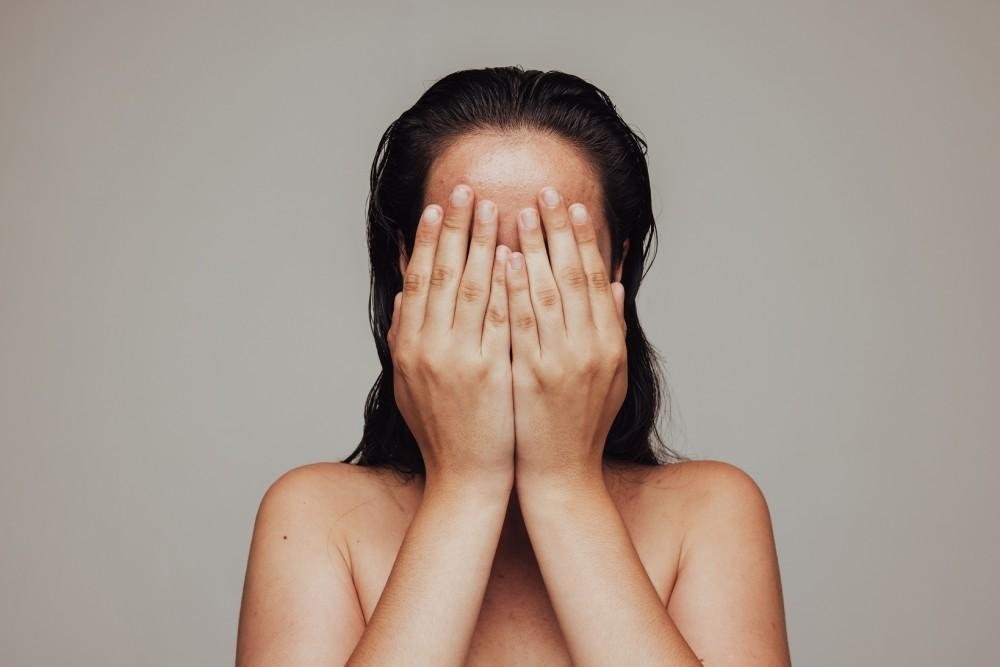
While hirsutism’s physical effects are well-documented, its emotional and psychological toll can be just as significant. Women with excessive hair growth may experience low self-esteem, social anxiety, and depression as a result of their appearance. This condition can negatively affect their quality of life and interfere with personal relationships and social activities.
Psychological Challenges Associated with Hirsutism
Social Anxiety
Women with hirsutism may feel judged or ridiculed, leading them to avoid social situations, especially those where they have to reveal their body, such as swimming or at the beach. Social anxiety can develop because they fear others will notice their excessive hair growth and make critical remarks.
Low Self-Esteem and Body Image
Constant concern about appearance can lead to diminished self-worth and a poor body image. Women may feel frustrated or helpless when traditional beauty standards don’t align with their own experiences. Self-esteem issues can become deeply ingrained, leading to feelings of inadequacy or inferiority.
Depression
The emotional strain of dealing with hirsutism can contribute to more severe mental health issues, such as depression. Depression is a serious condition that should not be underestimated. Women who feel isolated or stigmatized due to their appearance may experience emotional distress that extends beyond the condition itself.
Body Image Issues
For many women, hair growth in non-traditional areas like the face can cause significant distress about their appearance. Women may become hyper-aware of their bodies and avoid social interactions to prevent others from noticing their excess hair growth. This can severely impact their mental well-being and sense of self-worth.
It is crucial for women with hirsutism to seek support, both from healthcare providers and emotional support networks, to better cope with the challenges of this condition. WebMD provides helpful information on the emotional impact of hirsutism, offering resources for managing psychological stress.
Additionally, if you’re interested in learning about other health conditions that affect women’s physical and emotional well-being, you may find it beneficial to explore how to recognize early signs of breast cancer as part of a holistic approach to women’s health.
Treatment Options for Managing Excessive Hair Growth in Women
There are several treatment options available to manage hirsutism. These treatments vary depending on the underlying cause of the condition, the severity of symptoms, and personal preferences.
1. Lifestyle Changes: Regulating Hormones Naturally
In some cases, lifestyle changes can help reduce symptoms. A healthy diet, regular exercise, and weight management can help balance hormones, especially for women with PCOS or those who are overweight. While these changes may not eliminate hirsutism entirely, they can significantly reduce the severity of symptoms.
2. Medications for Hormonal Control
Medications that target hormone regulation are often used to treat hirsutism, particularly for women who have PCOS or other hormone imbalances. These medications can reduce androgen levels, decreasing the production of male-pattern hair growth.
Birth Control Pills
Combined oral contraceptives (birth control pills) help regulate hormones by lowering androgen levels, which can reduce excessive hair growth. Many women find birth control helpful for controlling hirsutism, especially when it’s linked to PCOS.
Anti-Androgens
Medications like spironolactone block the effects of androgens, and they are often used to treat hirsutism. Spironolactone can reduce hair growth, especially on the face and body. Women taking spironolactone should be monitored by a healthcare provider to manage potential side effects.
Topical Creams
Prescription creams like eflornithine can slow down hair growth when applied directly to affected areas. These creams can be effective for areas like the face, especially the upper lip and chin.
3. Hair Removal Treatments
Laser Hair Removal
Laser hair removal is one of the most effective treatments for hirsutism. It uses concentrated light to target and destroy hair follicles, preventing future hair growth. It’s especially effective for women with dark hair and light skin.
Electrolysis
Electrolysis uses electrical currents to destroy hair follicles, providing permanent hair removal. This method works on all skin and hair types, making it a versatile option for many women. However, electrolysis requires several sessions and can be more time-consuming than laser treatments.
Waxing and Shaving
For temporary hair removal, waxing, shaving, and plucking can help remove unwanted hair. Though these methods don’t address the underlying causes of hirsutism, they provide immediate relief for unwanted hair.
4. Psychological Support
For many women, emotional support is an essential component of managing hirsutism. Seeking therapy, joining support groups, or consulting with a counselor can help address the emotional and psychological toll this condition can have. Women with hirsutism can benefit from a holistic approach to treatment, addressing both the physical and emotional aspects of the condition.
Hirsutism is a condition in which women develop excessive, coarse, dark hair in areas typically seen in men—such as the face, chest, back, or abdomen. While it’s not usually dangerous, it can be emotionally distressing and often signals an underlying hormonal imbalance.
In many cases, hirsutism is a symptom, not a disease—a visible sign of deeper issues such as polycystic ovary syndrome (PCOS), adrenal disorders, or even genetics. Understanding what causes hirsutism and how it affects a woman’s physical and emotional well-being is essential for timely diagnosis and treatment.
What Does Hirsutism Look Like?
Women with hirsutism may notice:
- Thick, dark hair on the upper lip, chin, cheeks
- Chest or abdominal hair similar to male-pattern distribution
- Hair on the back, shoulders, or inner thighs
This hair growth is distinct from the light, fine “peach fuzz” typically found on female bodies. The hair becomes terminal hair—longer, darker, and more visible.
What Causes Hirsutism?
The primary driver behind hirsutism is elevated levels of male hormones (called androgens), such as testosterone. All women produce small amounts of androgens, but when these hormone levels rise beyond normal, or when hair follicles become overly sensitive to androgens, excessive hair growth can result.
1. Polycystic Ovary Syndrome (PCOS)
PCOS is the most common cause of hirsutism, responsible for up to 75–80% of cases. PCOS is a hormonal disorder that causes the ovaries to produce an excess of androgens. Women with PCOS may also experience:
- Irregular menstrual cycles
- Acne or oily skin
- Weight gain or difficulty losing weight
- Infertility
If you’re experiencing hirsutism alongside these symptoms, PCOS may be the root cause.
2. Adrenal Gland Disorders
Conditions like congenital adrenal hyperplasia, Cushing’s syndrome, or adrenal tumors can lead to an overproduction of androgens. The adrenal glands sit atop the kidneys and play a vital role in regulating hormones, including those affecting hair growth.
3. Medications
Certain medications can trigger hirsutism as a side effect. These include:
- Anabolic steroids
- Danazol (used for endometriosis)
- Minoxidil (used for hair loss)
- Testosterone therapy
If excessive hair growth begins after starting a new medication, speak with a healthcare provider immediately.
4. Genetics and Ethnicity
Some women may be more genetically predisposed to hirsutism. It’s more common in women of Mediterranean, South Asian, and Middle Eastern descent. If your mother or sister also had excessive hair growth, your risk may be higher, even without a hormonal imbalance.
5. Obesity and Insulin Resistance
Being overweight can increase androgen production and worsen insulin resistance—both of which contribute to hirsutism. In fact, insulin plays a role in stimulating ovarian androgen production, further linking obesity to excessive hair growth in women.
Impact on Physical and Emotional Health
While hirsutism doesn’t usually pose serious physical health risks by itself, the emotional and psychological impact can be significant.
Emotional Effects Include:
- Anxiety and social withdrawal
- Low self-esteem or body image issues
- Depression in some cases
- Embarrassment or discomfort in relationships
It’s important to understand that hirsutism is not a cosmetic problem—it’s a medical one. Emotional distress is a valid consequence and should be addressed alongside the physical treatment.
Diagnosis and When to See a Doctor
If you notice sudden or progressively worsening hair growth, especially with other symptoms like irregular periods, deepening voice, or rapid weight gain, consult a healthcare provider.
Doctors may order:
- Blood tests to check androgen levels (e.g., testosterone, DHEA-S)
- Ultrasound to examine ovaries (for PCOS)
- CT scan or MRI (if adrenal tumors are suspected)
Early diagnosis can prevent complications and help you regain control over your body and confidence.
Treating Hirsutism: What Are Your Options?
Treatment depends on the underlying cause but may include:
- Hormonal therapy: Birth control pills or anti-androgens (like spironolactone) to reduce male hormone effects.
- Topical creams: Eflornithine slows facial hair growth.
- Hair removal methods: Laser hair removal, electrolysis, or waxing can manage visible hair, though they don’t address the root cause.
- Lifestyle changes: Weight loss and insulin regulation (through diet and exercise) are particularly helpful in PCOS-related hirsutism.
Final Thoughts
Hirsutism is more than unwanted hair—it’s often the result of a complex interplay between hormones, genetics, and lifestyle. While it may feel embarrassing or isolating, know that you’re not alone. With medical guidance, emotional support, and treatment, hirsutism can be effectively managed, helping you regain both your appearance and peace of mind.
If you suspect you have hirsutism, don’t ignore it. Seek support, ask questions, and advocate for your health.
Conclusion: Managing Hirsutism with Confidence
Hirsutism is a common yet often misunderstood condition that can significantly impact a woman’s physical and emotional health. Understanding the causes, seeking appropriate treatment, and addressing the emotional side of the condition are key components of managing hirsutism effectively. With proper medical care, lifestyle adjustments, and emotional support, women can regain control over their bodies and feel confident once again.
Explore more articles on health and wellness or leave a comment below to share your experiences or thoughts on hirsutism. We’d love to hear from you!
Frequently Asked Questions (FAQs)
1. What causes hirsutism in women?
Hirsutism is commonly caused by polycystic ovary syndrome (PCOS), genetic factors, certain medications, Cushing’s syndrome, and menopause. It is related to an imbalance of male hormones (androgens).
2. How is hirsutism treated?
Treatment options include lifestyle changes, medications like birth control or anti-androgens, and hair removal treatments such as laser therapy or electrolysis.
3. Can hirsutism be reversed?
While hirsutism cannot always be completely reversed, treatment can significantly reduce symptoms. Laser hair removal and electrolysis provide long-term relief, while hormonal treatments help manage the root cause.
4. Is there any cure for PCOS-related hirsutism?
While there is no permanent cure for PCOS-related hirsutism, hormonal therapies, weight management, and lifestyle changes can help manage the condition and reduce hair growth.
5. How does hirsutism affect mental health?
Hirsutism can lead to low self-esteem, anxiety, social withdrawal, and depression. Seeking support from healthcare professionals and engaging in psychological counseling can help address emotional challenges.
